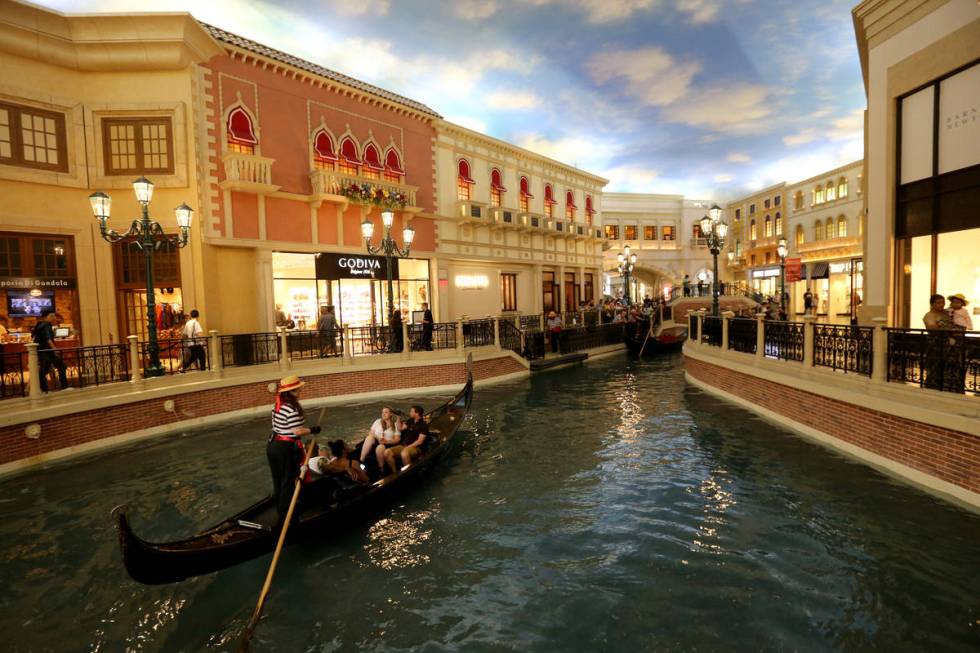With Las Vegas Sands deal, Apollo bets valley’s economy bounces back

In late 2006, with Las Vegas’ heated economy seeing a frenzy of deals, investment firm Apollo Management struck a blockbuster: a nearly $30 billion buyout of casino chain Harrah’s Entertainment.
The deal did not go as planned, as the economy soon crashed, and the casino company, later renamed Caesars Entertainment Corp., pushed its operating unit into bankruptcy and was bought for far less than its prior sales price.
Today, the economy is in rough shape again, albeit for different reasons, and Apollo is making another multibillion-dollar wager on America’s casino capital — but this time, the firm can only hope it’s rolling the dice on the way out of a national crisis, not on the way in.
Apollo Global Management, as it’s now known, and casino landlord Vici Properties, a Caesars spin-off, recently reached a deal to purchase The Venetian, the Palazzo and the Sands Expo and Convention Center for about $6.25 billion from casino operator Las Vegas Sands Corp.
It’s a major investment after a year of major upheavals sparked by the coronavirus pandemic.
The transaction also is a shakeup in the casino industry, as it marks an exit from the Strip for Las Vegas Sands, a major operator in Macao and Singapore.
“Asia remains the backbone of this company,” Chairman and CEO Rob Goldstein, a longtime Sands executive who took the helm after founder Sheldon Adelson died in January, said when announcing the sale March 3.
Apollo executives were unavailable for an interview Friday.
During the boom days, Apollo partnered with investment firm TPG to acquire Harrah’s. The casino operator announced the deal in December 2006, saying the all-cash buyout was valued at around $27.8 billion, including the assumption of about $10.7 billion in debt.
The deal closed in January 2008 — the final valuation was $30.7 billion — but the economy was already stumbling by then. Months later, it did a faceplant.
New York investment giant Lehman Brothers collapsed in September 2008, helping trigger the worst recession in decades. Few cities were hit as hard as once-roaring Las Vegas, as property values plunged, foreclosures swept through the valley and job losses skyrocketed, especially in construction.
Waves of businesses also went bankrupt, and casino operators were not spared the turmoil.
Caesars Entertainment Corp. posted nearly $3 billion in losses in both 2013 and 2014. In early 2015, its operating unit filed for bankruptcy protection with a plan to slash around $10 billion from its mountain of debt.
It emerged from bankruptcy in 2017. As part of that, Caesars transferred ownership of its real estate to the newly formed Vici Properties and paid it rent while still operating the properties.
In 2019, Reno’s Eldorado Resorts announced it was acquiring Caesars in a roughly $17.3 billion deal. The transaction closed last summer.
Over the past year, the coronavirus pandemic has kept people home and away from crowds for fear of getting infected, devastating tourism, the foundation of Southern Nevada’s casino-heavy economy. But with vaccines rolling out, and infection rates dropping lately, there is hope that the pandemic’s end is in sight.
We’ll find out soon enough whether Las Vegas’ economy bounces back from the misery of the pandemic. Apollo and Vici have more than 6 billion reasons to hope it does.
The Review-Journal is owned by the family of Sheldon Adelson, the late chairman and CEO of Las Vegas Sands Corp.
Contact Eli Segall at esegall@reviewjournal.com or 702-383-0342. Follow @eli_segall on Twitter.